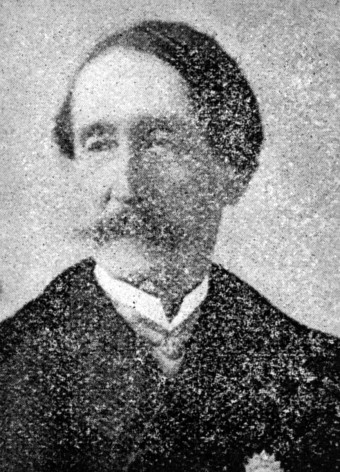This Day in History: April 10th- The Great Meddler
This Day In History: April 10, 1866
 “Mercy to animals means mercy to mankind” – Henry Bergh
“Mercy to animals means mercy to mankind” – Henry Bergh
On April 10, 1866, one man became a hero for millions who could not advocate for themselves. Countless animals were saved from abuse, torture, and death when New York philanthropist Henry Bergh took up their cause and founded the American Society for the Prevention of Cruelty to Animals (ASPCA).
Henry Bergh was born to a life of wealth, privilege, and influence. In 1863, President Lincoln appointed him to a diplomatic post at the court of Czar Alexander II in Russia. He was horrified when he witnessed peasants beating horses too exhausted to rise and continue pulling carts. While touring Spain, his stomach turned at the violent and very bloody nature of bullfighting.
Inspired by the success of The Royal Society for the Prevention of Cruelty to Animals in England, Bergh resigned his post in Russia and declared his mission to work on behalf of these “mute servants of mankind.” When presenting his argument at Clinton Hall, he reasoned that the fight against animal cruelty was a bipartisan issue that touched everyone.
“This is a matter purely of conscience; it has no perplexing side issues,” he told the assembled audience. “It is a moral question in all its aspects.”
His impassioned plea was enough to prompt many dignitaries to sign the “Declaration of the Rights of Animals.” Bergh’s persuasiveness certainly had something to do with the anti-cruelty law passing the very next week on April 10, 1866. Naturally, Bergh was the first president of the ASPCA.
The ASPCA first focused its efforts around the well-being of horses and livestock, then dogs and cats. Bergh also campaigned tirelessly to abolish dog and cockfighting. (Incidentally, contrary to what you might think, chickens were first domesticated for cockfighting, not food.)
Not surprisingly, Bergh was a strong supporter of the anti-vivisection movement. New Yorkers became accustomed to seeing Bergh patrolling the streets. He inspected slaughterhouses and lectured in schools. He wasn’t afraid to insert himself verbally or physically into a situation when an animal was being mistreated.
Louisa May Alcott and Ralph Waldo Emerson (who would compose and read his eulogy in 1888) were strong supporters of Bergh and his cause.
Bergh took issue with the master showman P.T. Barnum and his practice of feeding live rodents to reptiles. (Bergh was called “The Great Meddler” by some; Barnum may have been one of those people on occasion.) However, there must have been no hard feelings – Barnum was a pallbearer at Bergh’s funeral.
The ASPCA became the prototype for 25 other similar organizations in North America. When Henry Bergh passed away in 1888, 37 of the then 38 states in the Union had enacted anti-animal cruelty laws. The Citizen wrote after his death:
“…so firm a hold did he take on the public sense of right that it is impossible that his work shall not be continued. He has made too many converts to render it all likely that his commonwealth will ever relapse into a condition to witness cruelty to animals without resentment.”
If you liked this article, you might also enjoy our new popular podcast, The BrainFood Show (iTunes, Spotify, Google Play Music, Feed), as well as:
- Abraham Lincoln the Animal Lover
- Are There Any Animals Other Than Humans That Commit Suicide?
- The Life Saving Animal Blood Worth $60,000 Per Gallon and the Truth About the Colour of Spider Blood
- There Was Once An Elephant Condemned to Execution by Hanging
- Where the Word “Jumbo” Came From
| Share the Knowledge! |
|





As in almost every aspect of life, it is wise not to be an extremist (in either direction) in this aspect. Here is the reasonable way of thinking and acting, based on thousands of years of reflection by the wisest of civilized minds, guided by divine revelation:
One of God’s commandments (the 7th or 8th, depending on one’s numbering) enjoins respect for the integrity of creation. Animals, like plants and inanimate beings, are by nature destined for the common good of past, present, and future humanity. Use of the mineral, vegetable, and animal resources of the universe cannot be divorced from respect for moral imperatives. Man’s dominion over inanimate and other living beings granted by the Creator is not absolute; it is limited by concern for the quality of life of his neighbor, including generations to come; it requires a religious respect for the integrity of creation.
Animals are God’s creatures. He surrounds them with his providential care. By their mere existence they bless him and give him glory. Thus men owe them kindness. God entrusted animals to the stewardship of those whom he created in his own image. Hence it is legitimate to use animals for food and clothing. They may be domesticated to help man in his work and leisure. Medical and scientific experimentation on animals is a morally acceptable practice if it remains within reasonable limits and contributes to caring for or saving human lives.
It is contrary to human dignity to cause animals to suffer or die needlessly. It is likewise unworthy to spend money on them that should as a priority go to the relief of human misery. One can love animals, but one should not direct to them the affection due only to persons.
Animals do not have rights. Only persons (humans) have rights. Humans have duties toward animals, not because the latter have any rights, but because our dignity requires us to behave in a humane way toward creatures of lower natures.
People like you are the reason we can’t have nice things.